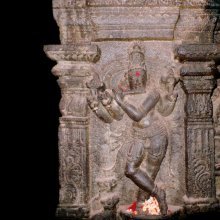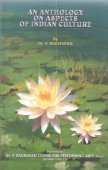Kannan, Kannaṉ, Kaṇṇaṉ, Kaṉṉaṉ, Kaṉṉāṉ: 3 definitions
Introduction:
Kannan means something in Hinduism, Sanskrit, the history of ancient India, biology, Tamil. If you want to know the exact meaning, history, etymology or English translation of this term then check out the descriptions on this page. Add your comment or reference to a book if you want to contribute to this summary article.
Images (photo gallery)
In Hinduism
Natyashastra (theatrics and dramaturgy)
Source: Shodhganga: The significance of the mūla-beras (natya)Kannan is another name for Kṛṣṇa, as mentioned in the Kaṭalāṭukkāṭai, which is a chapter of the Cilappatikāram: an ancient epic authored by Ilango Adigal representing an important piece of Tamil literature.—Accordingly, while describing the Alliam (one of the eleven dances): This is a war dance danced by Kannan (Kṛṣṇa) in order to defeat the deceitful Kamsa who came in the form of an elephant.

Natyashastra (नाट्यशास्त्र, nāṭyaśāstra) refers to both the ancient Indian tradition (shastra) of performing arts, (natya—theatrics, drama, dance, music), as well as the name of a Sanskrit work dealing with these subjects. It also teaches the rules for composing Dramatic plays (nataka), construction and performance of Theater, and Poetic works (kavya).
India history and geography
Source: Institut Français de Pondichéry: The Shaivite legends of KanchipuramKannaṉ (கந்நன்) (in Tamil) refers to Krsna in Sanskrit, and represents one of the proper nouns mentioned in the Kanchipuranam, which narrates the Shaivite Legends of Kanchipuram—an ancient and sacred district in Tamil Nadu (India). The Kanchipuranam (mentioning Kannaṉ) reminds us that Kanchipuram represents an important seat of Hinduism where Vaishnavism and Shaivism have co-existed since ancient times.

The history of India traces the identification of countries, villages, towns and other regions of India, as well as mythology, zoology, royal dynasties, rulers, tribes, local festivities and traditions and regional languages. Ancient India enjoyed religious freedom and encourages the path of Dharma, a concept common to Buddhism, Hinduism, and Jainism.
Biology (plants and animals)
Source: Google Books: CRC World Dictionary (Regional names)Kannan in India is the name of a plant defined with Eclipta prostrata in various botanical sources. This page contains potential references in Ayurveda, modern medicine, and other folk traditions or local practices It has the synonym Verbesina conyzoides Trew (among others).
Example references for further research on medicinal uses or toxicity (see latin names for full list):
· Proceedings of the Indian Science Congress Association (1990)
· Revisio Generum Plantarum (1891)
· Nova Genera ac Species Plantarum (1845)
· Glimpses in Plant Research (1988)
· Revista Brasileira de Genética (1986)
· Genera Nova Madagascariensia (1806)
If you are looking for specific details regarding Kannan, for example extract dosage, health benefits, chemical composition, side effects, diet and recipes, pregnancy safety, have a look at these references.

This sections includes definitions from the five kingdoms of living things: Animals, Plants, Fungi, Protists and Monera. It will include both the official binomial nomenclature (scientific names usually in Latin) as well as regional spellings and variants.
See also (Relevant definitions)
Starts with: Kan-anipu, Kannamjike, Kannan-elini, Kannan-karelenal, Kannanan, Kannanasa, Kannancanam, Kannancey, Kannancu, Kannanculalai, Kannani, Kannanitamuli, Kannankirai, Kannankuti, Kannanmuli, Kannannur Illavan Madam, Kannannur Illavan Madam.
Ends with (+7): Alarkannan, Ankannan, Ayirankannan, Cerukannan, Cherukannan, Cukkirakkannan, Irattakkannan, Kakkaikkannan, Kamalakkannan, Katiyalur-uruttirankannan, Malaikkannan, Murakkannan, Nerrikkannan, Onraraikkannan, Orakkannan, Orraikkannan, Patin-enkannan, Tamaraikkannan, Tarukannan, Tirumalinkannan.
Full-text (+36): Pancakammalar, Karnan, Irattakkannan, Venkatirmatalai, Murakkannan, Kamalakkannan, Kancakaran, Ayirankannan, Utalakkannan, Alarkannan, Palanucan, Ankarkoman, Muralitaran, Kannakkanan, Malaikkannan, Cukkirakkannan, Kannan-elini, Nokkena, Patin-enkannan, Cukkiracari.
Relevant text
Search found 15 books and stories containing Kannan, Kannaṉ, Kaṇṇaṉ, Kaṉṉaṉ, Kaṉṉāṉ; (plurals include: Kannans, Kannaṉs, Kaṇṇaṉs, Kaṉṉaṉs, Kaṉṉāṉs). You can also click to the full overview containing English textual excerpts. Below are direct links for the most relevant articles:
Tiruvaymoli (Thiruvaimozhi): English translation (by S. Satyamurthi Ayyangar)
Pasuram 5.3.4 < [Section 3 - Third Tiruvaymoli (Macu aru Coti)]
Pasuram 3.6.5 < [Section 6 - Sixth Tiruvaymoli (Ceyya Tamaraik Kannan Ay)]
Pasuram 7.7.8 < [Section 7 - Seventh Tiruvaymoli (Elaiyar avo)]
Temples in and around Madurantakam (by B. Mekala)
Sri Varadaraja Perumal Temple < [Chapter 3 - Temples of Madurantakam Taluk]
The Bhattar < [Chapter 6 - Social and Economic Activities]
Jnaneshwari (Bhavartha Dipika) (by Ramchandra Keshav Bhagwat)
Verse 3.25 < [Chapter 3 - Karma-yoga]
Verse 3.14-15 < [Chapter 3 - Karma-yoga]
Verse 8.4 < [Chapter 8 - Akshara-brahman-yoga]
Amaravati Art in the Context of Andhra Archaeology (by Sreyashi Ray chowdhuri)
Making of a Monk and practice of Austerities < [Chapter 3 - Amarāvatī and the Formative Stage of the Buddhist Art]
Parasol or Chatra < [Chapter 3 - Amarāvatī and the Formative Stage of the Buddhist Art]
The Great Departure or Mahābhiniṣkramaṇa < [Chapter 3 - Amarāvatī and the Formative Stage of the Buddhist Art]
Sivaprakasam (Study in Bondage and Liberation) (by N. Veerappan)
Related products


